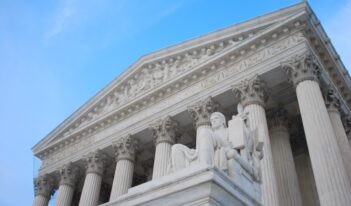
The Regulatory Review celebrates the end of 2015 by featuring our top analysis posts from the past year.
As the new year arrives, The Regulatory Review would like to reflect on the many important regulatory developments and debates that occurred in the United States and around the world throughout 2015. We also want to recognize some of the excellent work we had the privilege to feature on The Regulatory Review this past year. From Monday, December 28th through Wednesday, December 30th, we are presenting the top essays published on The Regulatory Review over the past twelve months, based on the number of page views for the work appearing in each of our opinion, news, and analysis sections.
Today we feature, in alphabetical order by author, the top analysis stories from 2015. Visit our “Regulatory Year in Review” series main page for information about the top news and opinion stories.
 Toward a Middle Ground in Regulating E-cigarettes
Toward a Middle Ground in Regulating E-cigarettes
Wataru Aikawa | April 9
Should e-cigarettes be regulated? If so, how should they be regulated? Public health experts are divided on these issues. Some argue for a soft approach, lest regulations impede the potential of e-cigarettes to allow heavy smokers to cease smoking.
 Is OSHA Burying Its Head in the San with Proposed Silica Rule?
Is OSHA Burying Its Head in the San with Proposed Silica Rule?
Wataru Aikawa | May 5
Health experts claim that inhaling tiny crystalline silica particles can cause respiratory impairment and may result in lung cancer. Since crystalline silica exposure is common in many occupations, the Occupational Safety and Health Administration (OHSA) proposed a rule recently that would reduce the risks of respirable crystalline silica in the workplace.
 Do Healthier School Lunches Mean More Food Waste?
Do Healthier School Lunches Mean More Food Waste?
David Bernstein | July 21
You can lead children to vegetables, but will they eat them? Critics of the most recent revision of U.S. school lunch nutrition standards claim that increased fruits and vegetables may mean increased plate waste. However, new research suggests that students are eating more fruits and vegetables because of the new standards.
Divya Chawla | April 15
Polls show that 78% of Americans believe medical marijuana with a physician recommendation should be legal. Meanwhile, federal law prohibits the sale, possession, production, and distribution of marijuana. However, twenty-three states have “legalized” the use of marijuana for medical purposes, creating conflicts with the federal law.
 Finding Common Ground on the Impacts of Air Pollution Regulation
Finding Common Ground on the Impacts of Air Pollution Regulation
Katie Cramer | October 13
Heralded as lifesavers by advocates and derided as job killers by critics, federal air pollution rules have for decades generated an outsized portion of litigation and political controversy. Proponents of these rules highlight health and environmental benefits, while opponents raise concerns about compliance costs and delivering reliable electricity service through the power grid.
 A Squandered Opportunity for Effective Consumer Protection?
A Squandered Opportunity for Effective Consumer Protection?
Michael Fletcher | October 8
By many measures, the economy is now recovering, but a recent paper based on the congressional testimony of a law professor at George Mason University argues that the financial reform legislation is actually hampering economic growth.
 The American Pizza Community Bites Back
The American Pizza Community Bites Back
David Freenock | July 23
On an average day, more than 40 million Americans will consume pizza. However, unlike in many restaurants where customers order in person from a limited number of options, consumers place 90 percent of all pizza orders over the phone or online, and they may order pizza in one of 34 million different combinations.
 Legislative Changes May Improve the Black Lung Benefits Program
Legislative Changes May Improve the Black Lung Benefits Program
Brandon Kenney | February 2
Black lung disease kills hundreds of miners every year, but it is increasingly difficult for those afflicted with the disease to access promised federal benefits. After a spike in the number of miners with black lung, members of Congress introduced a bill in the last Congress that, if introduced again and passed in the 114th Congress, would lead to an overhaul of the benefits program.
 Dr. Seuss, Amtrak, and Dentists at the Supreme Court
Dr. Seuss, Amtrak, and Dentists at the Supreme Court
Brandon Kenney | July 7
Although the Court’s high-profile decisions involving the Affordable Care Act and marriage equality have captured widespread media attention, a variety of other decisions made by the Court over the last nine months will have significant impacts on government regulation in the United States.
 Employers, Whistleblowers, and Polluters Before the Supreme Court
Employers, Whistleblowers, and Polluters Before the Supreme Court
Christian Latham | July 8
This past term, the Supreme Court decided a considerable number of important regulatory cases. The Regulatory Review has already reviewed a number of those cases. But the Court also reached decisions on environmental policy, whistleblower protections, and the extent to which the courts can review certain administrative actions.
 Finding a Regulatory Framework for Social Enterprise
Finding a Regulatory Framework for Social Enterprise
Brandi Lupo | April 16
Particularly popular among millennials, the social enterprise sector—made up of companies like Warby Parker, FoodCycle, Divine Chocolate, and SoleRebels—is unlikely to wane as a fleeting phenomenon. Its longevity depends, however, on an effective regulatory regime that enforces social, environmental, and profit-driven bottom lines.
 New York City Considers a “Civil Gideon” for Housing Court
New York City Considers a “Civil Gideon” for Housing Court
Brandi Lupo | March 11
New York City may soon become the first city in the United States to provide free legal counsel to low-income tenants facing eviction. Can the city afford it? New York City Comptroller Scott Stringer, the city’s Chief Financial Officer, thinks it may be possible.
 Should Local Governments Support the Sharing Economy?
Should Local Governments Support the Sharing Economy?
Brandi Lupo | February 12
Companies in today’s so-called “sharing economy” face legal battles across the country with state and local regulators. But according to the authors of a new working paper, these companies may come to find state and local governments are their closest allies.
 When Behavior Science Meets Public Policy
When Behavior Science Meets Public Policy
Natalie Punchak | May 13
As evidenced by the Behavioral Insights Team launched by the UK government as well as the creation of a White House Social and Behavioral Sciences Team, so-called nudges have caught fire with policymakers around the globe. But what exactly is“nudging”? And how does its approach differ from traditional forms of regulation?
 The Case Against FDA Regulation of Laboratory-Developed Diagnostic Tests
The Case Against FDA Regulation of Laboratory-Developed Diagnostic Tests
Natalie Punchak | September 2
Over the past decade, the field of genomic medicine has experienced lightning-speed innovation. With the help of DNA extracted from Neanderthals, for example, scientists have gained important new insights into human evolution.
 The Case for FDA Regulation of Laboratory-Developed Diagnostic Tests
The Case for FDA Regulation of Laboratory-Developed Diagnostic Tests
Natalie Punchak | September 1
Before they can be commercially available, high-risk, life-sustaining medical devices such as pacemakers, HIV tests, and automated external defibrillators (AED) must undergo the Food and Drug Administration’s (FDA) premarket approval process—an extensive series of steps involving rigorous testing for safety and efficacy.
 The Marijuana Industry’s Access to Banks
The Marijuana Industry’s Access to Banks
Eric Schlabs | September 22
Vaults, armed guards, and paranoia are costs of doing business today in the recreational marijuana industry. Because they have little access to banking, marijuana business owners must conduct their day-to-day operations entirely in cash. “Nothing has gotten violent yet,” says Andrew Freedman, Colorado’s marijuana coordination director, “but we’re kind of asking for it.”
Legal Challenges to Fracking Regulation
Eric Schlabs | August 18
Hydraulic fracturing, more commonly known as fracking, has generated significant controversy and elicited starkly contrasting political responses. Some state and local governments actively encourage fracking, citing economic benefits of the domestic natural gas boom. Others have limited or even banned its practice due to environmental concerns.
Analyzing a Universal Basic Income
Tim Yang | February 9
In light of the Great Recession’s lingering impact on unemployment, policy pundits have suggested replacing existing unemployment insurance with a guaranteed, universal system that ensures everyone has a basic level of income. A recently released academic paper, however, disputes these suggestions, finding that unemployment insurance works better as a social safety net than a universal income scheme.
Author affiliations are provided in this list for identification purposes only. All views expressed are those of the authors and do not necessarily represent those of the affiliated organizations.






